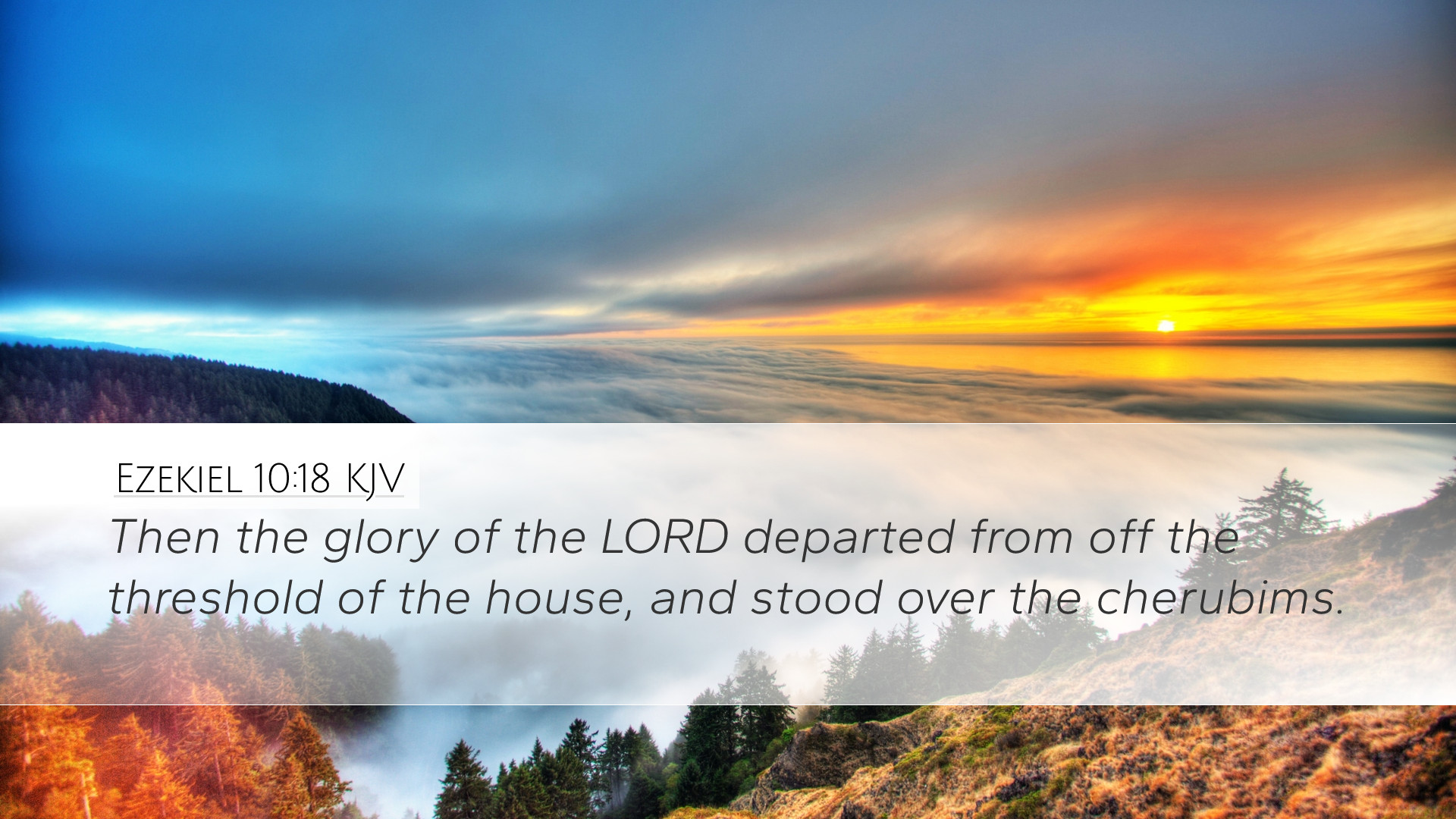Ezekiel 10:18 - Commentary
Verse Context: Ezekiel 10:18 states, “Then the glory of the LORD departed from off the threshold of the house, and stood over the cherubims.” This verse appears within a pivotal moment in Ezekiel’s prophetic vision, as he witnesses the departure of God’s glory from the temple in Jerusalem. This event symbolizes the impending judgment upon Israel and the departure of divine presence due to their unfaithfulness.
Overview of Commentaries
This analysis encapsulates various public domain commentaries, including those by Matthew Henry, Albert Barnes, and Adam Clarke, providing a deepened understanding of this verse’s significance concerning God’s glory, the temple, and the overall theological implications for Israel.
The Glory of the LORD
Eschatological Significance:
- According to Matthew Henry, the “glory of the Lord” represents God’s manifest presence among His people. The departure signifies serious consequences for Israel, illustrating that their sins have led to a severance in their relationship with the Almighty.
- Albert Barnes emphasizes that God's glory was a crucial aspect of Israel's identity and covenant. Its departure indicates God's judgment and a warning of destruction, as the divine presence is associated with blessing, protection, and favor.
- Adam Clarke aligns with the notion that the movement away from the temple acts as a profound warning, highlighting the effects of persistent disobedience and idolatry. His commentary underscores that the temple was not just a building but the epitome of divine interaction with humanity.
The Threshold of the House
Symbolism of the Threshold:
- Matthew Henry suggests that the threshold symbolizes a critical point of contact; it was from this spot that God’s judgment was pronounced. The departure across this threshold signifies a complete withdrawal of divine favor, marking a turning point for the nation.
- Albert Barnes describes the “threshold of the house” as a place of covenant and community. The glory leaving this symbolic space indicates a severe break in the relationship between God and His people.
- Adam Clarke elaborates on the imagery of the threshold, emphasizing that it represents both a physical and spiritual boundary—essentially a door to divine presence, which now stands closed due to Israel’s rebellion.
Stand Over the Cherubims
The Role of Cherubim:
- Matthew Henry notes that the cherubim are often associated with both guardianship and divine communication. The fact that God’s glory hovers over the cherubim suggests a continuity in divine watchfulness, even as God's presence departs from the temple.
- Albert Barnes points out that cherubim are representative of God’s majesty and power, and their presence indicates that God still retains authority, even in judgment. It carries the understanding that judgment does not eliminate God’s sovereignty.
- Adam Clarke relates the cherubim to divine knowledge and wisdom. His insight reinforces the idea that God’s insights are unchangeable, even in situations of judgment, as they embody the fullness of God’s attributes.
Theological Implications
Consequences of Israel's Actions:
- Matthew Henry articulates that this departure of glory serves as a stark reminder of the results of Israel’s sin, disobedience, and idolatry. For pastors and theologians, it serves as an important case study on the nature of divine discipline.
- Albert Barnes contributes that the departure was an indicator of the separation that sin creates between humanity and God. This has profound implications for understanding the nature of sin and the importance of repentance.
- Adam Clarke also addresses the nature of God’s judgment, presenting it as an act of necessity when righteousness demands it. His reflections provoke deeper considerations regarding the balance of justice and mercy within Christian theology.
Applications for Believers
Lessons from Ezekiel 10:18:
- This verse serves as a call for self-examination, urging believers to consider instances in their lives where they might have distanced themselves from God’s presence through sin.
- It highlights the importance of maintaining a vibrant relationship with God and the value of repentance as a means to restore that relationship, resonating with the discussions on grace throughout the New Testament.
- Pastors and spiritual leaders can draw parallels from this text to illustrate the necessity of fostering environments that honor and invite God’s presence, knowing that unfaithfulness can lead to its absence.
Conclusion
The commentary on Ezekiel 10:18 encapsulates a profound moment of loss in Israel's spiritual history. The departure of God’s glory signifies a momentous warning against complacency in faith and the dire consequences of turning away from divine covenant. By reflecting on insights from biblical commentators, contemporary readers—pastors, scholars, and students alike—can glean essential truths about the character of God, the nature of sin, and the continual need for vigilance in spiritual life.


